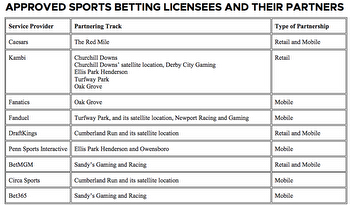Kentucky just legalized sports betting. What happens next?

LOUISVILLE, Ky. (WDRB) — An ebullient Gov. Andy Beshear on Friday morning signed a bill to make Kentucky the 37 state to legalize sports wagering hours after the socially conservative state Senate voted to approve House Bill 551.
Here’s what to know:
Where will Kentuckians be able to bet on sports?
The legislation allows sports wagering only in certain physical locations: horseracing tracks and their gaming venues that offer slots-like historical horseracing machines.
Expect horse tracks like Churchill Downs Inc. to create sports books at their historical gaming facilities, such as Derby City Gaming, Oak Grove Racing & Gaming and Newport Racing & Gaming.
"Churchill Downs Inc. is excited to bring our experience operating brick & mortar sports wagering venues to our home state of Kentucky," the company said in a statement Friday. "All of our (historical horse racing) facilities throughout the state were designed with this possibility in mind and will be ready to offer sports betting under the regulations and timing of the Kentucky Horse Racing Commission."
About 80% of the betting is expected to happen virtually via apps and websites. Technology platforms like DraftKings, FanDuel and Bet MGM will be able to operate in Kentucky — no more trips over state borders to Indiana or Ohio to access their services. However, the website-app providers will have to cut at least one of the horseracing tracks in on the revenue.
While the legislation doesn’t spell out the terms, it requires apps and websites to contract with at least one of the tracks to get a license to operate in Kentucky. The law says that each of the nine tracks may contract with up to three service providers.
Rep. Al Gentry, a Louisville Democrat who co-sponsored the bill, said it’s unlikely that consumers will notice the involvement of the horse tracks.
“It’s going to be very similar to other states where you will have an app, and that service provider will have their own application,” he said. “So when you are wagering on your phone or on your app, you're probably not even going to be aware that the track has a license that oversees all of that.”
When will Kentuckians be able to bet on sports?
Sometime between this summer and the end of 2023.
The legislation takes effect 90 days after the end of the legislative session, which means the end of June. (Attorney General Daniel Cameron’s office will set the exact date).
However, the Kentucky Horse Racing Commission — the exclusive regulator of sports betting in Kentucky — has six months from the effective date to come up with administrative regulations for sports wagering.
Will the KHRC take all six months, or be ready to go this summer? A spokeswoman for the Public Protection Cabinet, which includes the KHRC, wouldn’t comment.
“It would sure be nice to be able to place wagers on college football when the college football season rolls around,” Gentry told WDRB. “So I think that would be, hopefully, a realistic goal.”
What sports are able to be wagering upon?
Professional sports, college sports, international competitions such as the Olympics and World Cup, “electronic sports, e-sports, and competitive video game events.”
Sports in which participants are primarily under 18 — in other words, high school sports — are not eligible.
The bill also does not legalize online poker, nor fantasy sports. Those were removed to make the legislation more palatable to conservatives.
Gentry previously told WDRB that was "ridiculous" to legalize sports betting but not betting on fantasy sports, but supporters needed to compromise.
How much tax revenue will this generate?
About $22 million per year, according to previous testimony from Rep. Michael Meredith, the primary sponsor.
What information will consumers have to provide?
The law states that sports betting platforms must verify the identity of their users and collect the following information: name, age, physical address (other than a post office box), a phone number, and an e-mail address.


































